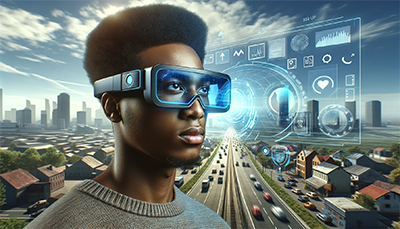Immersive realities, such as virtual reality, provide a fully immersive educational experience that leads to greater engagement and understanding of subjects covered in classes. Students are not only able to engage with the material, other students, and their instructor; they also can better understand the context of those relationships while immersed in the virtual environment. These experiences support the learning outcomes for the program and prepare students for use of these technologies in their professions.
Submissions from 2025
Integrating Art Therapy and Emerging Technologies for Enhanced Neuroplasticity and PTSD Intervention, Piper Hutson and James Hutson
1785 Parisian Salon Project: New Methods and Practical Innovations in Digital Heritage Reconstruction, James Hutson, Charles O'Brien, Wesley Wolfe, Kayla Kraff, and Trent Olsen
Simulating Chill: Exploring the Cognitive and Therapeutic Potential of Cold VR Environments, Jessica Turner, Piper Hutson, and James Hutson
Submissions from 2024
Neurological Foundations and Technological Interventions for Dyslexia: Advancements and Challenges, Piper Hutson and James Hutson
Neurological Foundations and Technological Interventions for Dyslexia: Advancements and Challenges, Piper Hutson and James Hutson
Technoculture and Language Models in Archaeology: Reconstructing and Preserving Cultural Narratives Through Digital Humanities, James Hutson
Art in the Age of Virtual Reproduction, James Hutson
From Simulacra to Reanimation: Resurrecting the (Un)Dead, James Hutson
Macrocosm of History: Everywhere. Everything. Everyone, James Hutson
MedMicroMaps, A Novel Decision-Tree Guide for Infectious Diseases Differential Diagnoses, and Evaluation of Pre- and Post-Pandemic User Engagement by Preclinical Medical Students, Jason Ceballos, Tavsimran Luthra, Lucia Garces-Torres, Valerie Lentz, Jack Nelson, Claudia Carceles-Roman, Ian Holyoak, and Jane Harrington
Art and the metaverse, James Hutson
Submissions from 2023
Discourses Across Periods of Time, Amanda Raquel Moreno
Learning Communities in the Metaverse: Integrating High-Impact Practices and Durable Skills in a First-Year Experience Course Taught Entirely in a Virtual Learning Environment, James Hutson, Jason Lively, and Elizabeth Ponder Melick
South, Southeast, and East Asia Tour (VR), Tara Vansell
Virtual Reality at Workplace for Autistic Employees: Preliminary Results of Physiological-Based Well-Being Experience, M. A. Reyes-Consuelo, D. Michaud, J. Proulx-Guimond, Jocelyne Kiss, C. Vincent, G. Edwards, James Hutson, J. Ruel, S. Letscher, V. Psyche, C. Papi, M. Caouette, I Feillou, and Piper Hutson
Central and South America Tour (VR), Tara Vansell
Exploring the Effectiveness of Virtual Reality Role-Playing in Debating Repatriation of Artworks in Active Learning Art History Classes, James Hutson and Trent Olsen
European Tour (VR), Tara Vansell
Shared cinematic experience and emerging technologies: Integrating mixed-reality components for the future of cinema, James Hutson
Neuroaffirmative Approaches to Extended Reality: Empowering Individuals with Autism Spectrum Condition through Immersive Learning Environments, James Hutson and Caitlyn McGinley
Virtual learning environments and digital twins: Enhancing accessibility, diversity, and flexibility in training secondary educational administrators, James Hutson, Robert Steffes, and Joe Weber
VR Let My Creativity Out: Youth Creating with Immersive Learning Technologies, Paula MacDowell Dr.
GEOZOO Whitepaper, Tara Vansell
Using Story Maps to Deliver VR Experiences -PowerPoint, Tara Vansell
Using Story Maps tp Deliver VR Experiences -Presentation, Tara Vansell
Enhancing Employability for Autistic Graduates: Using TRIZ Theory to Design Virtual Reality Solutions for Fostering Inclusive Communications in Workplace Environments, Jonathan Proulx Guimond, Jocelyn Kiss, Reyes Consuelo, Miguel Alejandro, Dominique Michaud, Rency Inson Michel, Alexandre Ménard, Isabelle Feillou, Geoffreyjen Edwards, James Hutson, Claude Vincent, Julie Ruel, Sylvain Letscher, Valéry Psyché, Cathia Papi, and Martin Caouette
Haptic Preservation of Cultural Ephemera: an Extended Reality Solution Using Stereoscopic Experience Replication for Victorian Parlor Culture, Paige Sandheinrich and James Hutson
Curio-Stereo: A VR Application for the Viewing of Stereograph Cards, Paige Sandheinrich
Session 6: “VR Let My Creativity Out”: Youth Creating with Immersive Learning Technologies, Paula MacDowell
Session 8: The Virtual Viking Longship Project: A Study in the Future of Liberal Arts Teaching and Research, David Neville, Timothy D. Arner, and Austin Mason
Reconstructing the Parisian Salon de 1785 in VR, Charles O'Brien
Virtual Reality and Gamification in Post-Secondary Education, Tiffani Barner
In the studio with virtual reality: Student perceptions and potential integrations into art and design curriculum, James Hutson, Jason Lively, and Joe Weber
Rethinking the Virtual Reality Field Trips: Pedagogical Strategies for Classroom Instruction, James Hutson
Digital Twins and Cultural Heritage Preservation: A Case Study of Best Practices and Reproducibility in Chiesa dei SS Apostoli e Biagio, James Hutson, Joe Weber, and Angela Russo
Museums and the Metaverse: Emerging Technologies to Promote Inclusivity and Engagement, James Hutson and Piper Hutson
A Proposed Meta-Reality Immersive Development Pipeline: Generative AI Models and Extended Reality (XR) Content for the Metaverse, Jay Ratican, James Hutson, and Andrew Wright
Submissions from 2022
The role of virtual reality in art therapy to mitigate autism spectrum disorder (ASD) symptoms, James Hutson
Virtual Reality and Video Game Gatekeeping, Autumn Franke
R.I.S.E. of Virtual Reality, Bob Steffes
Virtual Reality and Learning: A Case Study of Experiential Pedagogy in Art History, James Hutson and Trent Olsen
A Virtual Reality Educational Game for the Ethics of Cultural Heritage Repatriation, James Hutson and Ben Fulcher
Social Virtual Reality: Neurodivergence and Inclusivity in the Metaverse, James Hutson
Gamification of Education and Learning: Heuristic Elements, Player Types, and Learning Outcomes for Art History Games, James L. Hutson Jr.
Virtual Reality and Art History: A Case Study of Digital Humanities and Immersive Learning Environments, James Hutson and Trent Olsen
Submissions from 2021
Digital Humanities and Virtual Reality: A Review of Theories and Best Practices for Art History, James Hutson and Trent Olsen
Digital Humanities: Immersive Realities, David Neville, Enrique Cachafeiro, and Swati Chawla


